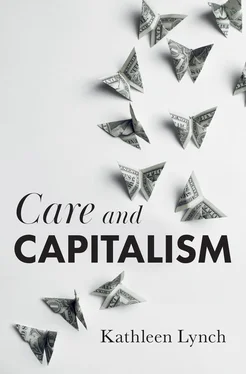Though disregard for the needs and sufferings of others is not the preserve of capitalism, it is strongly associated with it as a political-economic system, not least because the making of profit at the expense of others and of nature requires a cheapening and abusing of life in all its forms, especially given the finiteness of humans’ and nature’s resources (Patel and Moore 2018). When all that counts is what is countable in monetary terms, human relations become care-less.
The everyday activities of properly functioning capitalism do not produce forms of concern that lead to a sense of responsibility to others. People are constructed as interchangeable within capitalist logic and, as such, individually dispensable; fashioned as units of human capital, they are instrumentalized, habitually formed and re-formed in the service of the market and thereby distanced from others (Ferrarese 2017a). There is a coldness towards the needy other that is endemic to the logic of capitalism (MacDonald 2011).
While undermining care ethics is not unique to capitalism, it does take distinct forms under neoliberal capitalism: as the latter is globalized, and increasingly unregulated, it can be more predatory in character, exploiting and exacerbating crises in pursuit of profit in ways that are deeply harmful (Jessop 2019). Even in theory, profit-making is no longer regulated by the self-discipline and responsible stewardship that Weber (1930) regarded as the hallmarks of capitalism in the nineteenth and early twentieth century. Rather, the rational pursuit of self-interest is regarded as having a high moral purpose (Rand and Branden 1964).
Neoliberal capitalism has many disorders and contradictions undermining it internally (Streeck 2016; Jessop 2019); however, it also has many powerful ideological tools at its disposal to perpetuate disorder in its own interests. One of its defining features is its ability to conflate economic, moral and political understandings (Harvey 2005) so that what was once regarded as ethically reprehensible is now regarded as normal. Neoliberal capitalism has encoded the pursuit of profit at all costs as an exciting individual choice, a moral purpose governed by meritocratic principles , and a system that guarantees personal security for those who are worthy (Boltanski and Chiapello 2005).
As Weber (1930) and, more recently, Boltanksi and Chiapello (2005) argued, people need powerful moral reasons for rallying to capitalism. What gives neoliberal capitalism much political credibility is that it has managed to colonize public discourses on morality in a way that makes winner-takes-all profit-making virtuous. In lieu of solidarity, globalized capitalism offers unique forms of excitement and liberation (especially from the local) and opportunities to realize personal ambitions. The enticement and excitement of capitalism culturally are that it offers choices, especially in consumption terms. Even if such choices are between equally valueless goods, choice symbolizes that one has access to the power and autonomy that the market offers. The poor and not-so-poor are incorporated into society via credit and indebtedness, while ideologies of consumer power, consumer protection and consumer goods create the illusion of power and sovereignty (Soederberg 2014).
Neoliberal capitalism also lays claim to servicing social justice and the common good by rewarding the meritorious , the ‘intelligent and hardworking’. To be a winner is to be entrepreneurial in a self-interested way. Winning is framed not only as virtue, a social good, but also as a game that simultaneously offers adventure and excitement without human cost. An actuarial spirit of calculation is normalized for all classes in a way that was unthinkable a generation or two ago (Peters 2005). For those who ‘fail’ in the merit stakes it offers charity. While charity long predates capitalism, contemporary philanthrocapitalists have framed it in a new corporate form as a politically appropriate method of redistribution; they regulate charitable ‘giving’ on their own terms in a highly strategic and business-like manner, a giving that reinforces rather than challenges the injustices of capitalism (Giridharadas 2019). Yet their charity provides them with a valorized public persona and a sense of pride in their own generosity, no matter how unwarranted that may be (Browne 2013).
Security is a prize also available to those who behave responsibly , and who are active in managing themselves and availing themselves of opportunities within neoliberal capitalism. ‘Moral’ people are those who secure their futures by regular reinvention, mentoring and retraining. They also manage their privileges responsibly by securing their transfer intergenerationally via property, including cultural capital, the management of education and money, and social networking. Solidarity with the more vulnerable is replaced by the ethic of self-responsibilization, especially among the middle classes, as they fear the loss of class standing in increasingly precarious work and welfare regimes (Mau 2015). Solidarity has become more and more conditional on self-responsibilization (Paskov and Dewilde 2012; Frericks 2014).
Unlike the early years of organized, European-led, colonial capitalism, when powerful oligarchs and monarchs sought moral approval prospectively and often retrospectively from their marauding and murdering in the acquisition of wealth (Patel and Moore 2018), the accumulation of wealth is now a universally approved precept for the labourer as well as for the venture capitalist. Not to follow this precept is to be deemed foolish and irresponsible. It is the universalization of self-interest as virtue, and the related distancing and invisibilization of harm, that make neoliberal capitalism particularly care-less.
Conclusion: Contradictions, Residuals and Resistances
The deregulation of capitalism, especially financial capitalism, since the 1980s, aligned with the exponential rise of digitalized communication technologies, has given corporate globalized capital untrammelled power in a world order where effective regulatory governance remains the preserve of nation states (Streeck 2016). 8
As global competition intensified under the winner-takes-all-provisions of monopoly capitalism, by the end of the twentieth century the human detritus created by growing hierarchical divisions started seeping out of the cesspit of capitalist democratic neglect. It did not always arrive in the expected and manageable, individualized (nation-state-controllable) forms of drug and alcohol addiction, homelessness and petty crime, or even in a coherent party politics of socialism. It arrived unexpected and uninvited in the form of desperate and frightened asylum seekers and refugees; it found collective expressions in ethnic and religious-induced nationalism, xenophobia and welfare protectionism reflected in the rise of new-right movements across Europe and the US (Mudde 2007; Golder 2016). The internal contradictions of capitalism (Polanyi 1934) began to erode its political and moral façade in a neoliberal era producing cynicism, violence, anger and revolt, as well as a new populist politics of nationalism and anti-immigration. The cultural residues (Williams 1977) of nationalism and racism that were latent within already existing neoliberal capitalist states were awakened.
But the contradictions of capitalism do not generate dissent solely in negative terms through violence, war and terrorism, managed and orchestrated for the greater part by powerful men. They are not the only makers of dissent historically or contemporarily. Capitalism is not homogeneous even when defined in its own terms (Hall and Soskice 2001; Bresser-Pereira 2012). In every society there are alternative forms of economic and social organization that stand outside the capitalist nexus, be these voluntary and community associations, worker and producer cooperatives, or cooperative banks (Sánchez Bajo and Roelants 2011; Roelants, Eum, Eşim, Novkovic and Katajamäki 2019). These are living proof of institutionalized dissent from neoliberal capitalist values. There are also many sites of resistance to capitalism outside the market economy, as exemplified in civil society movements as diverse as the Occupy campaigns, Black Lives Matter, Me Too, the International Women’s Strike 2017, land struggles in South America and Africa, and community gardens. 9
Читать дальше












